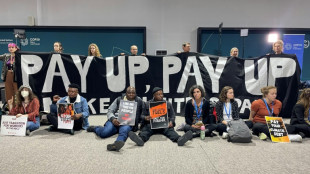
-
 Uganda opposition figure Besigye appears in military court
Uganda opposition figure Besigye appears in military court
-
General strike in Greece against cost of living

-
 UN nuclear chief welcomes Iran's 'concrete step' on uranium stockpile
UN nuclear chief welcomes Iran's 'concrete step' on uranium stockpile
-
Floods to shave 0.2 percentage points off Spain's growth

-
 Argentina's Contepomi makes one change for France Test
Argentina's Contepomi makes one change for France Test
-
'Steep climb' ahead as clock ticks on stalled climate talks

-
 Gatland changes four for Wales clash with South Africa
Gatland changes four for Wales clash with South Africa
-
'Sport will have the last word' as WRC title goes down to the wire in Japan

-
 Western powers move to censure Iran at UN nuclear meet
Western powers move to censure Iran at UN nuclear meet
-
US envoy presses Israel-Hezbollah truce bid in Lebanon visit

-
 'No controversy' around Alldritt exclusion for Argentina Test
'No controversy' around Alldritt exclusion for Argentina Test
-
Stock markets gain, dollar higher before Nvidia earnings

-
 New WHO financing mechanism put to the test
New WHO financing mechanism put to the test
-
Besigye kidnapping: Uganda president's doctor turned rival

-
 Star K-pop producer of NewJeans quits after legal spat with BTS agency
Star K-pop producer of NewJeans quits after legal spat with BTS agency
-
'Eternal' Nadal leaves legacy as he retires from tennis

-
 Vieira takes over at struggling Gerona
Vieira takes over at struggling Gerona
-
Australia's Kerevi banned for Morgan tackle

-
 Bellamy defies 'lunatic' reputation to inspire Wales revival
Bellamy defies 'lunatic' reputation to inspire Wales revival
-
Kremlin says US 'doing everything' to prolong 'war' in Ukraine

-
 Magritte painting nets auction record of $121 million
Magritte painting nets auction record of $121 million
-
Markets fluctuate as traders weigh geopolitical tensions

-
 N. Korea's latest weapon? Bombarding South with noise
N. Korea's latest weapon? Bombarding South with noise
-
'Kidnapped' Uganda opposition figure Besigye to appear at military court: lawyer

-
 Asian markets fluctuate as traders weigh geopolitical tensions
Asian markets fluctuate as traders weigh geopolitical tensions
-
'An inauspicious day': the landmines ruining Myanmar lives

-
 UN to vote again on Gaza ceasefire, US plans unclear
UN to vote again on Gaza ceasefire, US plans unclear
-
Japan's manga powerhouse 'Dragon Ball' turns 40

-
 Japanese, Koreans bottom of global love life survey
Japanese, Koreans bottom of global love life survey
-
Son blames 'mistakes' after South Korea held by Palestine in qualifier

-
 Japan ramps up tech ambitions with $65 bn for AI, chips
Japan ramps up tech ambitions with $65 bn for AI, chips
-
Lights, action, melodrama! Silent films get new reel at London haven

-
 Myanmar led world in landmine victims in 2023: monitor
Myanmar led world in landmine victims in 2023: monitor
-
ICC to sentence Timbuktu war criminal

-
 Ugandan opposition figure Besigye 'kidnapped', says wife
Ugandan opposition figure Besigye 'kidnapped', says wife
-
Australia's Jason Day eyes more major glory after resurgence

-
 Machu Picchu security boosted after visitors spread human ashes
Machu Picchu security boosted after visitors spread human ashes
-
Popovic hails Australia character in 'crazy' World Cup qualifier

-
 Taliban govt clearing 'un-Islamic' books from Afghanistan shelves
Taliban govt clearing 'un-Islamic' books from Afghanistan shelves
-
Argentina beat Peru as Uruguay hold Brazil

-
 Asian markets struggle as traders weigh geopolitical tensions
Asian markets struggle as traders weigh geopolitical tensions
-
Tatum stars as Celtics end Cavaliers unbeaten start

-
 Hurting India under pressure in blockbuster five-Test Australia series
Hurting India under pressure in blockbuster five-Test Australia series
-
'They killed her dream': Israel strike leaves woman footballer in coma

-
 Iraq holds its first census in nearly 40 years
Iraq holds its first census in nearly 40 years
-
Iraqis face tough homecoming a decade after IS rampage

-
 Russian net tightens around last civilians left in eastern Ukraine
Russian net tightens around last civilians left in eastern Ukraine
-
Olympic champion Tebogo aims to inspire next generation of African athletes

-
 Valencia on target as ten-man Ecuador upset Colombia
Valencia on target as ten-man Ecuador upset Colombia
-
'Rust' to premiere three years after on-set shooting


Kosovo's underground LGBTQ community leads 'double life'
For Flamur and his gay partner, freedom is restricted to the four walls of a Pristina apartment. Only behind lock and key can they be themselves while the ultra-conservative society outside still brands their love "unnatural".
The Kosovo couple have hidden their relationship for eight years.
Whenever they meet in public, common friends are invited in order not to raise suspicion. They also hesitate to even post on social media at the same time.
"It's difficult to live a double life," Flamur -- an assumed name he chose fearing potential stigma -- told AFP.
"We constantly take care not to be noticed."
Despite its pro-Western leadership, Kosovo is a largely conservative society and homophobia is widespread. More than 90 percent of the population are Muslim.
While recent surveys are unavailable, a 2015 study of the US-based National Democratic Institute (NDI) found Kosovo to be the most homophobic country in the Balkans, a region that is not known for tolerant views on sexuality.
More than 80 percent of LGBT Kosovars interviewed said they had been subjected to psychological abuse because of their sexual orientation, while 29 percent reported suffering physical violence.
Last month, there was a glimmer of hope for change.
Kosovo's leftist Prime Minister Albin Kurti pushed for a law that would recognise same-sex civil partnerships, but the motion was overwhelmingly rejected by the parliament.
Even many representatives of Kurti's Vetevendosje party voted against, including a hijab-wearing MP, Labinote Demi Murtezi, who called every non-heterosexual relationship "depravity and moral degeneration".
- 'Will of God' -
Had the reform been adopted, Kosovo would have become the first Muslim-majority country in the world to recognise same-sex unions.
Flamur said he believes "society as a whole" is not ready for such change. Rejecting the legislation "clearly shows how far we are from equal rights in Kosovo".
Although he came out to his family, most of them believe being gay is just a phase and that he will change one day.
Only his younger relatives have supported him and demand he be accepted as he is.
But even though Kurti has suffered politically for championing widely unpopular legislation, the activist-turned politician said he has no intention of giving up the fight for equality.
He recently told a local TV station he wants to present the reform to parliament "as soon as possible".
But he is sure to meet further fierce resistance from a unified front of those who would oppose the law.
Even the chairwoman of Kosovo's parliamentary commission for human rights, Duda Balje, openly opposes gay unions, saying they "do not belong to the culture, the tradition in which we have lived and live".
The issue inspired various religious leaders -- Muslims, Catholics and Jews -- to come out against the legislation saying they would "never accept unions... between two people of the same sex".
"We think that the word and will of God is being directly violated," a joint letter read.
The fact these religious figures stood together to oppose gay unions caused political analyst Rron Gjinovci to raise an eyebrow.
"We have never seen such union when it comes to, for example, corruption scandals," Gjinovci told AFP.
The premier has also received threats on his Facebook account.
"Be careful! You won't remain in your chair if the law passes," warned one post.
- 'Inevitable' -
Kosovo society is "captured by a heterosexual system" which prevents gay people from integrating "key economic, political, cultural and social activities because of their identity", according to local gay online platform Dylberizm.
Those brave enough to come out, like Blert Morina -- one of Kosovo's first openly transgender people -- believe passing the law would be "in line with Kosovo's aspirations to be recognised as a democratic and inclusive state".
Some public figures, such as renowned lawyer Arianit Koci, stressed there is no stopping the wheel of history.
"This trend cannot be stopped... just like the right to vote of women or even people of colour could not be stopped", Koci wrote on Facebook.
Although Flamur agrees change is "inevitable", it will take time.
"I think that allowing (same-sex) marriages and the benefits that come with it will happen in eight to 10 years", he told AFP.
But some can't wait that long.
The Dylberizm platform shares anonymous testimonies of discrimination and suffering members of the gay community in Kosovo endure.
A 21-year-old lesbian said she feels "deeply miserable" to the point of considering suicide.
"If my family finds out, they will kick me out."
P.A.Mendoza--AT
